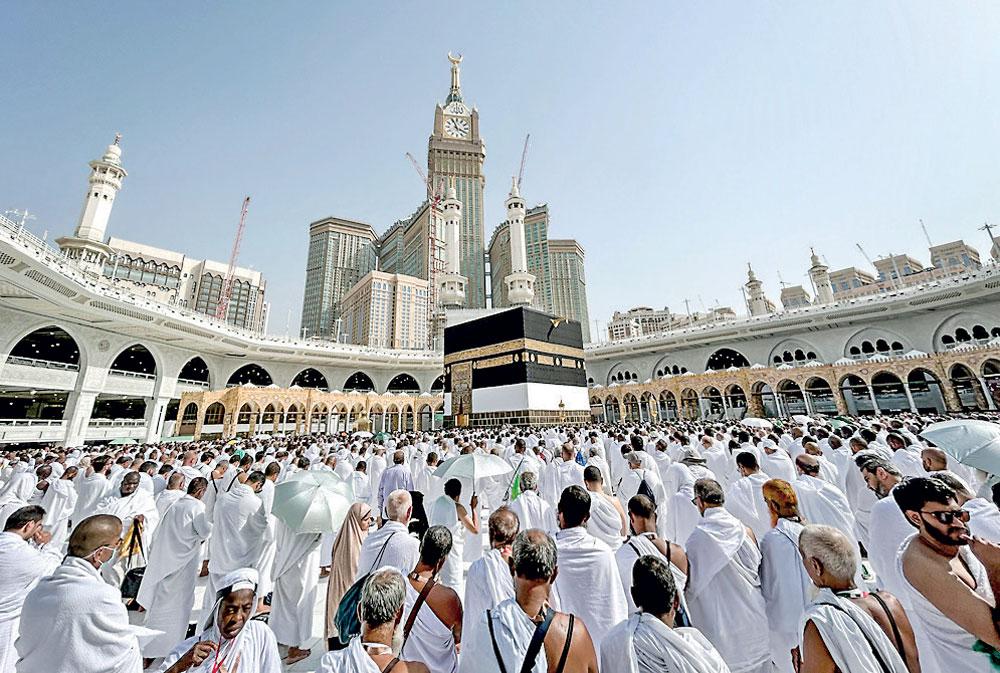Reply To:
Name - Reply Comment

Muslim pilgrims pray around the Kaaba, Islam’s holiest shrine, at the Grand Mosque in Saudi Arabia’s holy city of Makkah on June 12, 2024, ahead of the annual Hajj pilgrimage. Pic by Fadel Senna/AFP
 As millions of Hajj pilgrims and Muslims around the world celebrate Eid-ul-Adha, the festival of sacrifice, on Sunday, their focus should be as much on Gaza as it is on Prophet Ibrahim or Abraham.
As millions of Hajj pilgrims and Muslims around the world celebrate Eid-ul-Adha, the festival of sacrifice, on Sunday, their focus should be as much on Gaza as it is on Prophet Ibrahim or Abraham.
The prophetic mission of Abraham is both at the spiritual core of Hajj and the incendiary core of the more than a century-old Palestinian problem. Some 5,000 years ago, Abraham, the forefather of both Jews and Arabs, was commanded to sacrifice his son born to him in his old age. According to Muslims, the son was Ismail, or Ishmael, who was Abraham’s firstborn from his second wife, Hagar. But the Judeo-Christian belief is that it was Isaac, born to him and his first wife, Sarah, who was commanded to be sacrificed.
Hajj depicts various trials Abraham encountered in his life, starting from God’s command to leave baby Ishmael and Hagar in the barren desert in Makkah; Hagar’s search for water to feed her hungry infant; the command to sacrifice Ishmael; and how God saved him and sent a ram in his stead to be sacrificed.
According to the Quran, Hagar, desperate to find water for her hungry infant, ran between the hills of Safa and Marwah seven times in search of it. Finally, she found water gushing from the earth at the feet of her crying child. She named the water Zam Zam. Pilgrims to Makkah bring home litres of Zam Zam water to be distributed among relatives, neighbours, and friends.
The Quran also says Abraham and Ishmael built a mosque atop the old foundation of the world’s first place of worship. Called Kaaba, meaning cube in Arabic, the structure is roughly 50 feet high and about 35 by 40 feet at its base. Hajj pilgrims circumambulate the Kaaba, which is draped in a black cloth called Kiswa.
While pilgrims in white ascetic garb transform themselves into an existence devoid of ill thoughts, ill speech, and malevolent acts, shunning even plucking a leaf from a plant, and mark the Hajj festival by sharing the meat of sacrificial animals with the poor, the Israeli Zionists continue their slaughter of Palestinians in Gaza. The Palestinians await a ram similar to the one that saved Ishmael’s life, while Palestinian mothers, just like Hagar, run from place to place, in search of water and food for their starving children.
Certainly, the ceasefire proposal of US President Joe Biden is not the ram the Palestinians are waiting for. The UN Security Council on Monday approved the ceasefire proposal, which Biden claims is the Israeli proposal. But no Israeli leader has made a public statement welcoming it, though the US claims the Zionist state has accepted it. On the contrary, Israeli Prime Minister Benjamin Netanyahu vowed to continue the war until it achieves its objectives, which include the release of hostages, the defeat of Hamas, and securing Israel’s borders. With the Biden administration reduced to a vassal of Israel, it lacks the clout to coerce the Netanyahu government to go for a permanent ceasefire. Hamas has welcomed the plan, but with some amendments.
Since October 7, some 16,000 Palestinian children and more than 20,000 civilians have been killed in Gaza, which lies an hour’s journey in a car or just 60 kilometres away from the tomb of Abraham in the Israeli-occupied Palestinian town of Hebron.
This year, the Saudi authorities warned Hajj pilgrims against any move to politicise Hajj. It is clearly an attempt to prevent any pro-Palestinian activity during the Hajj. The Saudis justify their gag order based on the need to maintain order at the world’s largest religious gathering and to ensure nothing untoward happens.
But, according to Islam, the sanctity of a Muslim is much more honourable in the sight of God than the Kaaba and the holy mosque, of which the Saudi king is the custodian. In his last Hajj sermon, the prophet Muhammad said the life, the property, and the dignity of a believer are more sacred than the Hajj month, the Hajj day, and Arafah, a key station of the Hajj. Besides, speaking out for the oppressed is a religious duty. The failure to do so is a sin in Islam.
The inaction of Islamic nations, especially those in the Arab world, to protect the Gaza people raises the question of whether they have abandoned Islam, which, according to the Quran, is the religion of Abraham. The present-day Arab leaders seem detached from Abraham, except when they find refuge in the so-called US-brokered Abrahamic accords designed to normalise ties with Israel.
While the Palestinians, who are also descendants of Prophet Abraham, are being massacred and ethnically cleansed by Israel in a genocidal war, a promise God is said to have made to the Prophet Abraham 5,000 years ago is often cited to justify Israel’s land grab and illegal occupation of Palestine. According to Genesis 15:18, God made a covenant with Abraham, saying, “To your descendants, I have given this land, from the river of Egypt to the great river, the Euphrates.” According to the Judaic interpretation, supported by Genesis 26:3-5, the descendants are exclusively those of Isaac, Abraham’s second son from his first wife Sarah—not his first son Ishmael’s descendants, the Arabs.
The Quran, however, interprets descendancy in terms of spiritual closeness to Abraham and insists that whoever adheres to monotheism and works righteous deeds is an heir of Abraham.
The Quran says that Abraham was neither a Jew nor a Christian, but he was true in faith and fully submitted himself to God (3:67). Salvation in Islam is not based on bigotry but is found in one’s total submission to God. Islam rejects religious exclusivism. Those who believe in monotheism and do righteous deeds, whether they are Muslims, Jews, Christians, or Sabeans, will find their salvation, the Quran says (2:62).
The Quran, however, recognises that the Israelites were the chosen people but points out that they were chosen to take God’s message of salvation to every person on earth and not to claim racial superiority over others. The Quran says that mankind is one, and “the most noble of you in the sight of God is the most righteous of you.” (49:13).
However, in philosophical Judaism, the term chosen people does not grant any superiority to the Jews; it means a special responsibility to carry out God’s mission. It is such spiritual Jews who are opposing the war in Gaza and political Zionism, which is spearheaded largely by Ashkenazi Jews of European origin and Talmudic fundamentalists who give a literal meaning to the scriptures to justify genocide and create a racist and apartheid system in occupied Palestinian territories.
The holy land of Palestine should be inherited by the spiritual descendants of Abraham, not by Zionist child killers.